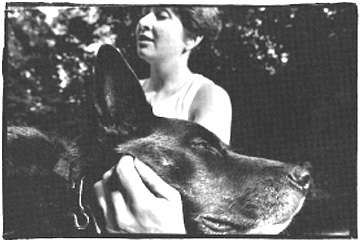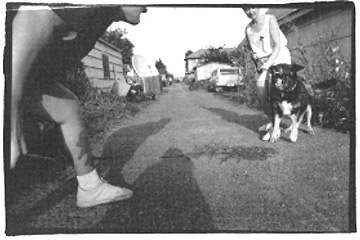
|
|
|
"About a year ago I started looking around [because] there were things I wanted to be able to do," Maribeth MacIntyre remembered. "I hiked a lot, and I wanted to be able to go out by myself and feel like I was okay." Maribeth happened into a pet store and saw a brochure for Project Safe Run, called the number and talked to the program's founder, Shelley Reecher. Soon Reecher had Maribeth sold on the program, and eventually, Maribeth agreed to start her own local chapter house for the organization that Reecher started more than 10 years ago in Eugene, Ore.

|
|
|
Now Maribeth has Kody, a five-year-old German Shepherd ("with a malamute in the wood pile") who used to be a rescue dog. He's since been trained by Reecher and now accompanies walkers, runners, hikers - anyone wishing to have a trained dog as a protector and companion. Like Pam Bruninga.
"I saw a flyer and it really made my day, because I didn't know such a program existed," Pam said. "It really makes me angry that you can walk the streets and have to really watch out for yourself. And anything to fight against that... "
After many times out together, Pam says Kody is a reliable companion.
"One night I got further than I expected to and it got dark on me. I ended up down below Shilshole," Pam said. "And the only real way that made sense for me to get back home was through the woods in the dark. I never would have gone up these trails by myself in the dark."
With Kody there, however, Pam made it home safely. Kody's extensive training, which includes basic obedience as well as resistance and agitation training, makes it so that anyone can take him out, providing they've gone through PSR's screening process.
Anyone who's interested in using a dog fills out what Maribeth calls a "credit application." After checking through the person's background, Maribeth (as all chapter house directors do) will meet with her or him a few times, get to know the person and tell them how Project Safe Run works. Maribeth will then go out with them the first time, spending 20 or 30 minutes talking about the dog, getting the person used to handling it, and then they're off.
People either donate their time or $25 a month to the non-profit organization. Senior citizens get to use Project Safe Run for free.

|
|
|
Diane Taylor runs another of the four local PSR chapter houses. She's got a boxer named Zoey, and she's been through the training courses and has found that she, too, has had to learn a few things.
"I've had to learn to lower my voice and enunciate when I talk to Zoey," she says, explaining that the dogs react more to the sounds and tone of voice of the person they're with than they do to other things. They know to only respond to that person's voice; eye contact and body language don't enter into it. In a way, they're just like children.
"If you are unwilling to correct your child in front of company," Diane says, "you can bet that that child is going to be a holy terror when you have people over. So you have to do the same with your dog. You don't want a dog, when you ask it to protect you, that's going to sit down and think about it for three or four seconds."
Maribeth says the chance of a threatening incident coming to fruition is virtually none when there's a PSR dog around. She recalled one time when an stranger approached her and Kody. Kody came through with flying colors, responding textbook-perfectly to Maribeth's instructions, and averting the potentially troublesome situation.
"Kody could've had a prime rib, medium rare, 422 ounce steak that night, but he immediately backed off [upon my command]," Maribeth said. "when the situation was over, the people who were watching came over and petted Kody. I have the utmost confidence in this dog, in Zoey, and in any of the dogs who go through the program."
Project Safe Run can be reached in Seattle at (206)782-9109 or 784-1592. The foundation also runs a for-profit training program called Canine Training and Security, which is available for similar training to any dog.
 |
 |
 |
 |
 |